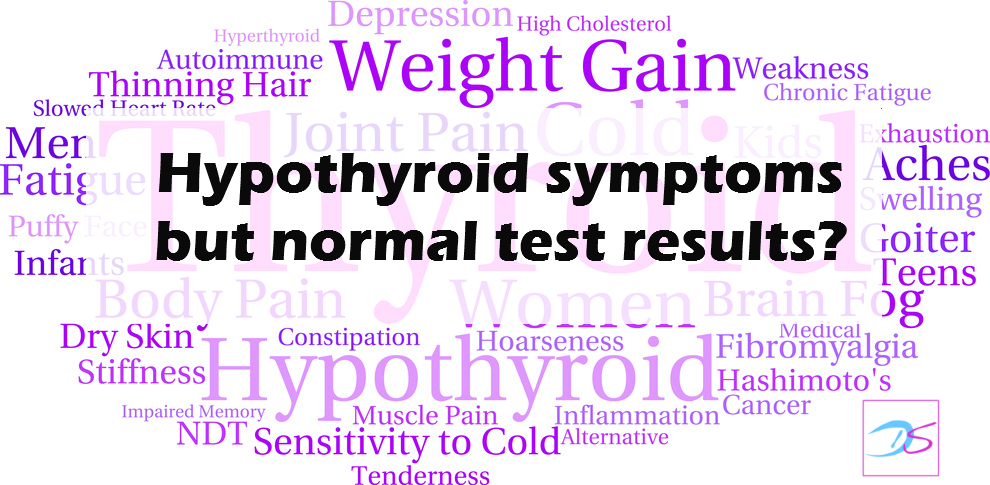Do you suffer from fatigue, exhaustion, brain fog, depression, constipation, hair loss, weight gain and low libido? Do you sometimes wonder where your old energetic self has gone?
You know something is off and you’ve asked your doctor to run some tests to uncover what’s behind this complete loss of energy, still feeling tired when you get up in the morning, worrying a lot and not being able to think as clearly as you used to. Then your results came back and everything looks just fine on paper, but fact is that you don’t feel fine and deep down you know it’s not normal and it certainly isn’t just happening in your head.
Maybe the thought of antidepressant medication came up, maybe you are taking some sort of antidepressant but you are not feeling that much better. You have googled your symptoms over and over and hypothyroidism keeps coming up as a very likely cause but your lab tests have proven otherwise. Or have they not?
Is it possible to suffer from hypothyroidism and have normal lab results?
The short answer is, yes, it’s absolutely possible. Here are three reasons why thyroid testing can miss hypothyroidism:
- Many insurance models will only cover TSH and free T4 testing and only if those values fall outside the reference range, further testing would be done. The thing is that you can be hypothyroid even with normal TSH and free T4 levels. Having normal TSH and free T4 levels only shows that your thyroid is making enough T4. However, T4 is mostly inactive and for our body to benefit from thyroid hormone, T4 first needs to be converted to T3 which is the active form of thyroid hormone. T3 then needs to be absorbed into the cells. So if you have hypothyroid symptoms, looking at free T3 levels is an important piece to the puzzle. The body needs selenium for efficient conversion from T4 to T3. So if you are deficient in selenium, there may be an issue here. Most of the conversion process happens in the liver, so if you are not converting well to T3, it’s worth looking at liver function and detoxification. For T3 to be absorbed into the cells, our body needs sufficient vitamin D and vitamin A. Deficiencies in these vitamins can thus also cause a problem. Compromised liver function and respective vitamin deficiencies can lead to hypothyroidism in the tissues with a perfectly normal TSH and free T4 levels because the thyroid itself is not the issue.
- Reference ranges don’t necessarily equal optimal ranges and they may well show wider intervals than what would be optimal for you. Maybe your T4 is at the lower end of the reference range but you would feel much better if it was at the higher end of the range.
- Omitting to look at the bigger picture. Our hormonal system is very sensitive and interconnected. At times of chronic stress (emotional, physical, hidden or obvious) our adrenal glands will product cortisol, our main stress hormone. At the same time this sends a signal to slow down thyroid function in order to conserve energy. One way of doing this is by converting T4 into reverse T3 instead of T3. Reverse T3 is also inactive and it puts the breaks onto the system because it goes and sits in the T3 receptors blocking it for T3, the active form. Another way to create hypothyroidism in the tissue. In this case, it’s important to figure out what caused the reverse T3 production and address this at the same time as kicking it off the receptors to make space for T3 again.
To summarise this delicate process:
The pituitary gland, located in our brain, signals the thyroid to produce T4 by sending Thyroid Stimulating Hormone (TSH).
For this to happen we need adequate protein, magnesium, vitamin B12 and zinc.
The thyroid then makes T4 (it makes other hormones too, so this is to simplify the process).
For this to happen, we need iodine, vitamins B2 and C.
Then T4 gets converted to T3, the active form of thyroid hormone (a large amount of this conversion happens in the liver).
We need selenium for the conversion.
Now the T3 enters the cells where it’s doing the job that it’s supposed to do (reverse T3 can put the breaks on this piece of the process by blocking the T3 receptors – if this happens, there is generally a reason for it that should not be ignored)
This process requires vitamins D and A.
Now that you know why it’s possible to suffer from symptoms of hypothyroidism with normal test results, you can talk to your doctor or find one who has experience with further testing. I want to encourage you to listen to your body and take charge of your own health.
If you like to receive more self-empowering health tips like this, you can subscribe to my newsletter here.


